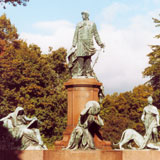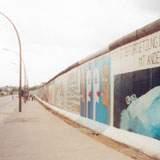History

Charlemagne, or Charles the Great, extended the Frankish Empire from 768 and was the Emperor of the Holy Roman Empire from 800 to 814, which included what is now modern-day Germany. In 1871 Otto von Bismarck founded the German Empire and became its first chancellor. From 1815 Germany had been split into small individual states after the fall of the first German Empire. After the end of the First World War (1914-1918), the empire was followed by the Weimar Republic, the first German democracy.
Economic and political turmoil and, in the main part, the lack of any democratic will on the part of the elite class, led to the collapse of the Weimar Republic on the 30th January 1933 when Adolf Hitler was appointed Chancellor of Germany. The National Socialist (Nazi) dictatorship that followed was responsible for genocide, the holocaust and the Second World War (1939-1945). Germany surrendered on the 8th of May 1945 and the allied victors – the Soviet Union, USA, Great Britain and France – took control of Germany and divided the country into four zones of occupation.
Under the auspices of France, Britain and the USA, the Federal Republic of Germany was founded on the 23rd of May 1949 in the three western zones. The new FRG was a parliamentary democracy with a written constitution known as the Basic Law ("Grundgesetz"). As the first federal chancellor, Konrad Adenauer had an enormous influence on the founding years of the FRG.
In the Soviet zone to the East, the German Democratic Republic was founded on the 7th of October 1949. The constitution of the GDR was on paper a parliamentary democracy but the state was dominated by the monopoly of power held by the governing socialist/communist party – the SED.

The defining symbol of the East-West conflict during the 1950s and 1960s was the Berlin Wall, which was erected in 1961. Willy Brandt’s and Walter Scheel’s government policy of "Ostpolitik" (encouraging closer relations with East Germany) in the 1970s finally brought East and West Germany closer together. The Soviet Union with "Glasnost" and "Perestroika" brought about political change, signalled the end of the Iron Curtain and brought about the downfall of the political system in East Germany in the late 1980s.
A flood of East German refugees since August 1989 and the so-called "Monday Demonstrations" for democratic reform in East Germany culminated in the fall of the Berlin Wall on the 9th of November 1989. The first free elections in the GDR took place in March 1990. Monetary, Economic and Social Union was established between East and West Germany on the 2nd of July 1990 and, on the 3rd of October 1990, Germany was reunited. Chancellor Helmut Kohl played a substantial role in the reunification of Germany and the growing together of Europe.
National Anthem
The lyricist Hoffmann von Fallersleben (1798-1874) wrote the "Lied der Deutschen" (Song of the Germans) in August 1841. The melody is based on a composition from Joseph Haydn (1732-1809) written in 1796. On 11 August 1922, the first social democratic government officially introduced the "Lied der Deutschen" as the national anthem. Today, the third verse is sung at official occasions.
Haus der Geschichte
The museum "Haus der Geschichte der Bundesrepublik Deutschland" in Bonn details the history of the Federal Republic of Germany starting in 1945. The Internet address is: ![]() www.hdg.de.
www.hdg.de.
Willy-Brandt-Allee 14
53113 Bonn
Tel: 0228 / 9165-0
Unter den Linden 2
10117 Berlin
"Fragen an die deutsche Geschichte" (Questions on German History)
Am Gendarmenmarkt
10117 Berlin
Admission free
